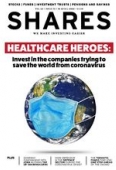Archived article
Please note that tax, investment, pension and ISA rules can change and the information and any views contained in this article may now be inaccurate.
Socially responsible investing: a stricter form of ESG

If you want your money to be invested in a morally correct way, looking at funds with the ‘socially responsible investing’ (SRI) tag may be a way to do it.
SRI is an attempt by those in the fund management world to apply a stricter and more focused style of ESG (environmental, social and governance) to investing.
According to SRI criteria set by index provider MSCI, and widely followed by most in the SRI world, stocks are first screened through an exclusion list, with zero tolerance for companies with ties to controversial weapons.
There is minimal tolerance (less than 5% of revenue) for companies with links to nuclear weapons, civilian firearms and tobacco, and low tolerance (no more than 15% of revenue) for alcohol, adult entertainment, conventional weapons, gambling, genetically-modified organisms and nuclear power. It also excludes companies deriving 30% or more of their revenue from thermal coal.
Once stocks have been filtered through the list, they’re all given an ESG rating and ESG controversies score (measuring their exposure to ESG controversies and negative events reflected in global media).
The top 25% of this remaining list in each sector and region (to avoid any bias) are included in MSCI’s SRI indices.
Taking the MSCI World SRI index as an example, the number of constituents is whittled down to just 386, compared to 1,643 for the MSCI World index.
APPLIES TO DIFFERENT ASSET CLASSES
This criteria is mostly used for stocks, but is also applied for corporate bonds, SRI funds and ETFs (exchange-traded funds).
While SRI investing attracted €733bn in the first eight months of 2019 according to asset manager Amundi, up from €621bn in the whole of 2018, it is still a nascent area of investing.
Until it becomes clearer what tangible difference active management can provide with SRI, it may be better to stick with passive options, particularly given the sizeable difference in cost between some active funds and passive exchange-traded funds (ETFs).
A study by two economists at St Andrews University, Jimmy Chen and Bert Scholtens, looked at the performance, cost and how actively managed SRI funds are in the US, a market that’s always been a few years ahead of the rest of the world when it comes to financial innovations.
They found that only active specialist thematic socially-responsible investment funds appeared to generate risk-adjusted returns that overcome their expense ratios.
Furthermore, they found that some active SRI funds seem to operate as ‘closet indexers’ with a low degree of active management.
WHERE TO START
When choosing the passive route, knowing where to begin can be difficult. Even though SRI is a subset of ESG, there’s still a proliferation of options out there and it’s hard to tell if they’re any good or actually stick to their principles.
The best way to look at SRI, according to Vanguard’s head of product specialism Mark Fitzgerald, is about mitigating risk.
‘There’s no dictionary definition,’ he explains. ‘SRI tends to be, take out companies that are doing things that are truly abhorrent. You could say it’s about mitigating risk such as “don’t expose me to those companies, please”.
‘It has an exclusionary approach, whereas ESG tends to be more than just mitigating risk, it’s more forward-looking.’
CHOICE OF INDEX
While this exclusionary approach can be helpful for investors as it can create a clearer picture of what they’re investing in, a look at the top 10 holdings of many SRI index funds and ETFs shows that, because the indices themselves are market cap weighted, you will still get exposure to oil and gas companies such as Royal Dutch Shell (RDSB) and BP (BP.).
That’s also why companies like BlackRock for example have switched their iShares SRI range to track MSCI SRI Select Reduced Fossil Fuel indices instead of the straight MSCI SRI ones.
In addition, it’s important to note that SRI is different to the likes of impact investing, which seeks out companies making most of their money from specifically addressing one of the world’s major social or environmental challenges as identified by the UN.
Impact funds tend to be mostly active and tend to have significantly higher fees.
With SRI funds and ETFs, your top holdings are likely to include Microsoft, Proctor & Gamble and Walt Disney, firms which it’s hard to argue are doing anything particularly bad in the world, but don’t exactly spring to mind when you think of ethical companies.
WHAT ARE YOU TRYING TO ACHIEVE?
Fitzgerald says the best way for investors to approach this area is to know what they’re trying to achieve.
Once they know what they do and do not want to invest in, picking the right SRI ETF or fund will require some digging and looking at fund factsheets, but it will help narrow their focus and ensure they end up with an investment that fits their values.
Fitzgerald adds that for those looking to go down the active route, it’s important not to lose sight of the benefits of diversification.
‘The more green you go and the more focused your investment becomes, you could be invested in just a handful of companies and your returns could become very different. It’s always important to keep in mind the diversification benefit.’
Important information:
These articles are provided by Shares magazine which is published by AJ Bell Media, a part of AJ Bell. Shares is not written by AJ Bell.
Shares is provided for your general information and use and is not a personal recommendation to invest. It is not intended to be relied upon by you in making or not making any investment decisions. The investments referred to in these articles will not be suitable for all investors. If in doubt please seek appropriate independent financial advice.
Investors acting on the information in these articles do so at their own risk and AJ Bell Media and its staff do not accept liability for losses suffered by investors as a result of their investment decisions.

 magazine
magazine










